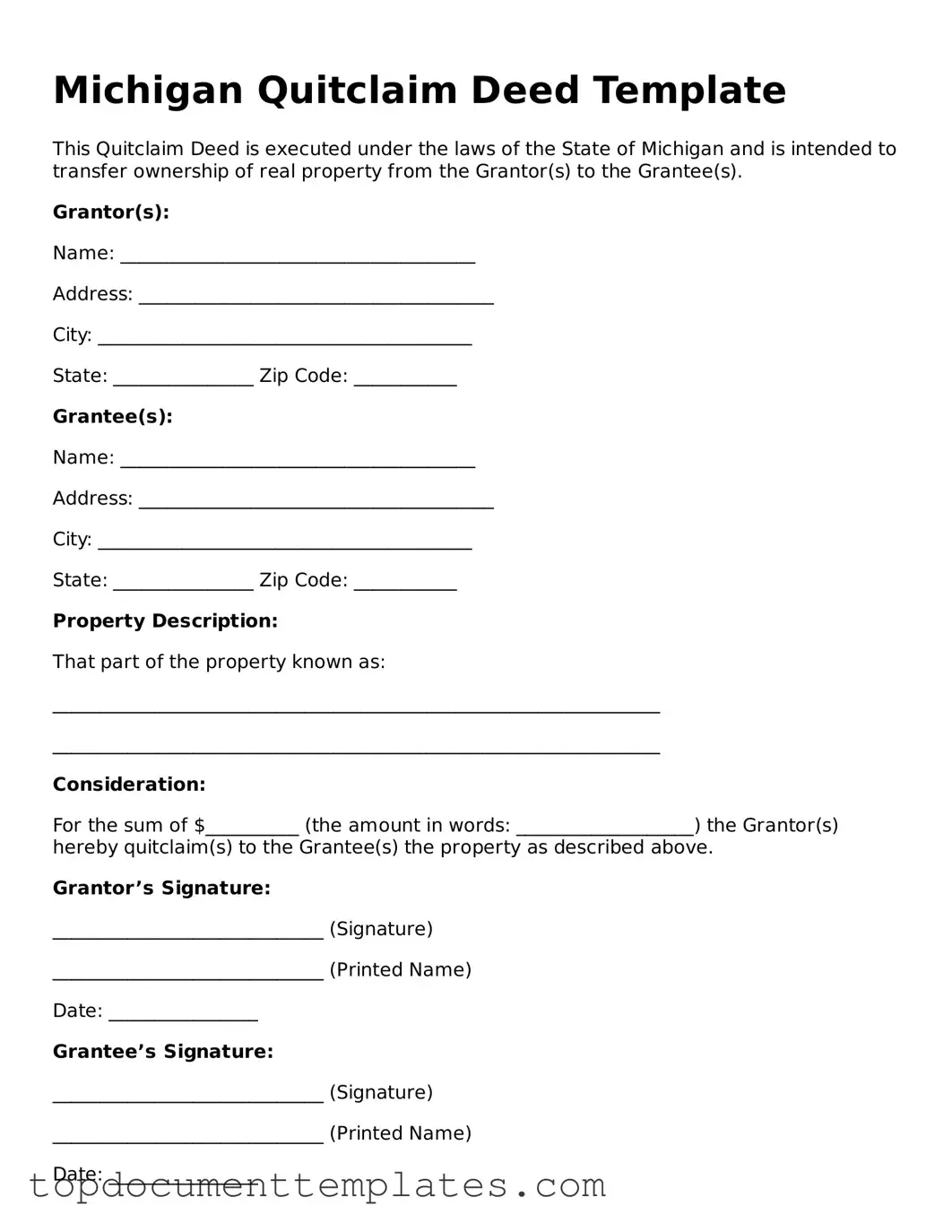Valid Quitclaim Deed Form for Michigan State
When it comes to transferring property ownership in Michigan, the Quitclaim Deed form serves as a straightforward and efficient tool. This legal document allows an individual, known as the grantor, to relinquish any claim they may have to a piece of real estate, effectively transferring their interest to another party, the grantee. Unlike other types of deeds, a Quitclaim Deed does not guarantee that the grantor holds clear title to the property; instead, it simply conveys whatever rights the grantor may possess at the time of the transfer. This makes it particularly useful in situations such as transferring property between family members, settling an estate, or clarifying title issues. It's important to note that while the Quitclaim Deed is easy to execute, it does not protect the grantee against potential claims from third parties. Therefore, understanding its implications is crucial for anyone considering its use. Additionally, the form must be properly filled out, signed, and recorded with the county register of deeds to ensure the transfer is legally recognized. With these factors in mind, the Quitclaim Deed can be an effective option for property transactions in Michigan.
Similar forms
- Warranty Deed: This document guarantees that the seller has clear title to the property and can transfer ownership. Unlike a quitclaim deed, a warranty deed provides protection against future claims on the property.
- Grant Deed: Similar to a warranty deed, a grant deed also conveys property ownership. It assures the buyer that the property has not been sold to anyone else and that there are no undisclosed encumbrances.
- Deed of Trust: This document secures a loan by placing a lien on the property. It involves three parties: the borrower, the lender, and a trustee, ensuring that the lender can reclaim the property if the borrower defaults.
- Mobile Home Bill of Sale Form: When finalizing mobile home transactions, refer to our essential Mobile Home Bill of Sale documentation to ensure a smooth transfer of ownership.
- Lease Agreement: While primarily used for rental arrangements, a lease agreement can convey certain rights to use a property. It differs from a quitclaim deed in that it does not transfer ownership but grants temporary rights.
- Real Estate Purchase Agreement: This contract outlines the terms of a property sale. It includes details about the purchase price and contingencies, serving as a precursor to the actual deed transfer.
Guidelines on Writing Michigan Quitclaim Deed
Once you have the Michigan Quitclaim Deed form ready, you will need to fill it out carefully. Make sure to have all the necessary information at hand to avoid any mistakes. After completing the form, you will need to sign it in front of a notary public and then file it with the appropriate county office.
- Obtain the Michigan Quitclaim Deed form. You can find this form online or at your local county clerk's office.
- Enter the names of the grantor(s) (the person giving the property) at the top of the form. Ensure the names are spelled correctly.
- Fill in the names of the grantee(s) (the person receiving the property) in the designated area. Again, check for correct spelling.
- Provide the legal description of the property. This information can usually be found on the property’s tax records or previous deed.
- Include the property address. Make sure to include the street number, street name, city, and zip code.
- State the consideration (the amount paid for the property). This can be a dollar amount or a statement indicating that the transfer is a gift.
- Sign the form in the presence of a notary public. The notary will verify your identity and witness your signature.
- Make copies of the completed and signed form for your records before filing.
- File the original Quitclaim Deed with the county clerk’s office where the property is located. There may be a filing fee.
File Information
| Fact Name | Description |
|---|---|
| Definition | A quitclaim deed is a legal document used to transfer ownership of real estate without any warranties. |
| Governing Law | In Michigan, quitclaim deeds are governed by the Michigan Compiled Laws, specifically MCL 565.25. |
| Use Cases | Commonly used in property transfers between family members or in divorce settlements. |
| Requirements | The deed must be signed by the grantor in front of a notary public. |
| Recording | To be effective against third parties, the quitclaim deed should be recorded with the local county register of deeds. |
| Consideration | No monetary exchange is necessary, but some form of consideration is typically stated. |
| Limitations | A quitclaim deed does not guarantee that the grantor has good title to the property. |
Other Popular Quitclaim Deed State Forms
What Does a Deed Look Like in Nj - Used in cases of property exchanges between parties.
Quit Claim Deed Ga - Landowners can use quitclaim deeds to gift property to others without monetary exchange.
The Florida Employment Verification form is a document used by employers to confirm the eligibility of their employees to work in the United States. This form plays a crucial role in ensuring adherence to federal and state employment laws. By verifying the work authorization of their workforce, employers not only comply with legal requirements but also contribute to the integrity of the labor market. For more information on this process, you can visit OnlineLawDocs.com.
Florida Quit Claim Deed Filled Out - It can help in divorce proceedings by transferring property rights.
